
“It’s time to make the survey of humanity’s ‘second genome’ more complete.” A perspective piece on how to fill in the microbiome map by Ruth E. Ley. “This week marks the tenth anniversary of the first big survey of microbial...

“It’s time to make the survey of humanity’s ‘second genome’ more complete.” A perspective piece on how to fill in the microbiome map by Ruth E. Ley. “This week marks the tenth anniversary of the first big survey of microbial...

Congratulations to Prof. Ruth Ley who has joined the Board of Trustees of the Jung Foundation! The Jung Foundation for Science and Research was established in 1967 by Ernst Emil Jung to promote science and social commitment. Since 1975, the...

Yesterday, Jacobo successfully defended his thesis titled “Insights into the human gut microbiome and its link with obesity and cardiometabolic diseases”. During the last 4.5 years in the Ley Lab he has developed new methods and computational approaches to study...

Congratulations to Lara Berg for successfully completing her Masters degree in the Ley Lab! For her thesis, Lara charaterised strain-level metabolic and syntrophic variations in the dominant human gut methanogen, Methanobrevibacter smithii. Using M. smithii samples obtained from stool samples...
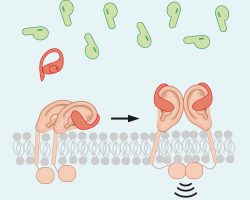
This week saw the release of our latest pre-print on bioRxiv! Titled Silent recognition of flagellins from human gut commensal bacteria by Toll-like receptor 5, this work was led by postdoc Sara Clasen and describes a mechanism for how the...

Congratulations are in order for Paul OG Jorzik, who has successfully completed his Master’s degree. Paul completed his thesis in the Ley Lab where he worked on the development of novel genetic systems for non-model human gut-associated bacteria. Congratulations Paul!
...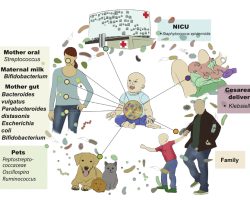
A new review article was published today from postdoc Hagay Enav and Ruth Ley, discussing strain level colonisation of the developing infant gut microbiome. While the establishment of the infant microbiome has long been an area of interest, recent technological...
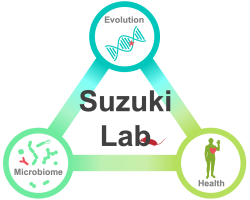
We are pleased and very proud to announce that postdoctoral researcher Taichi Suzuki has accepted a joint assistant professor position between the College of Health Solutions and Biodesign Institute at the Arizona State University and will be starting his own...
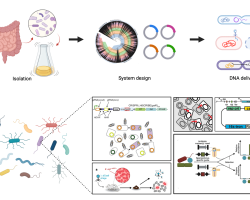
New article on microbiome engineering published in Cell (https://www.sciencedirect.com/science/article/abs/pii/S0092867421014975?via%3Dihub) in which our project leader and microbiome engineering expert James Marsh and Ruth E. Ley address the recent Cell issue by Jin et al. (https://www.sciencedirect.com/science/article/abs/pii/S0092867421015415) and discuss innovative tools for editing...
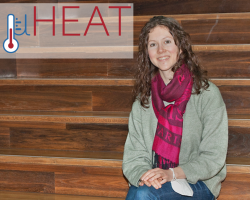
Congratulations to postdoctoral researcher Kelsey Huus who was awarded an EMBO fellowship to run the µHEAT study (‘Microbial-Human Ecology and Temperature’), which aims to understand interactions between the gut microbiome and the human immune system in the context of vaccination....
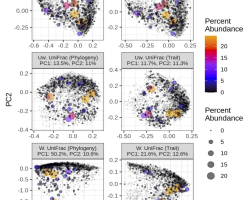
In our new publication in Environmental Microbiology, we explore the use of genome-level phylogenies and also genome-derived functional information for assessing alpha and beta diversity. Given the large number of microbial genomes that are now available, we sought to assess...
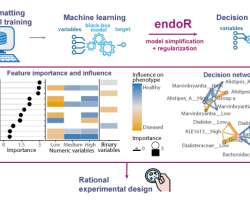
In our new preprint (Ruaud et al., 2022), we introduce endoR: an R-package to interpret machine learning models. We also present the application of endoR to human gut metagenomes to identify associations between H2 producers and methanogens in the human...
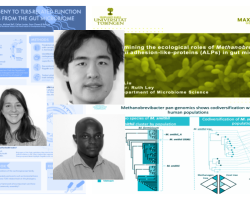
Congratulations to all doctoral students that presented their work, especially Andrea Borbon, Mirabeau Mbong, and Yihua Liu who were also recognized for the local MPI community among the finest. Andrea got the second place among the best posters presentations with...
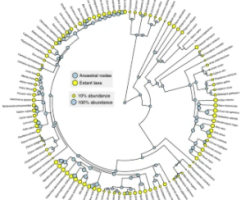
Archaea are often mistaken as bacteria, given that both are small, single-cell organisms. However, archaea are as genetically different from bacteria as humans are from bacteria. While archaea are found in most environments, including the human gut microbiome, relatively little...
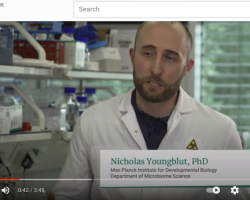
In this YouTube video, Nick Youngblut and colleagues discuss their latest work on the Archaea of the vertebrate gut. Read the original research paper in Nature Microbiology, and the less technical summary on our MPI blog.
...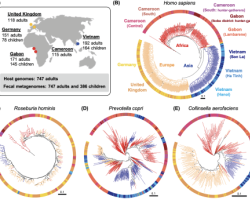
Ever wonder if H. pylori was the only gut microbe that tracked human population as they migrated out of Africa? Here we show evidence that others did too! By matching human genotype data to gut metagenome data, Taichi Suzuki, Liam...
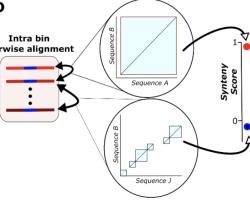
Check out Hagay Enav’s new tool, SynTracker, for comparing microbial strains using comparative synteny. It requires remarkably small fractions of genomes to do so, and is good at ignoring differences in strains at the SNP level.
...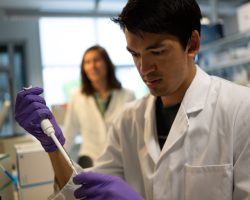
Here, doctoral student Michael Bell prepares samples for the Cryo-EM. Please see the Join Us page for more details!
...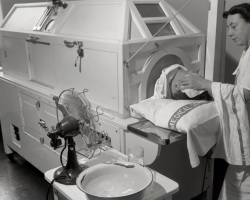
The 1929 Nobel Prize was given for pyrotherapy: heating people up to 41C to kill the Treponema causing syphilis. Ever wonder what fever does to the body’s microbiome? Post Doc Dr. Kelsey Huss has looked into it, and written a...

We have a new Doctor! Last week, Albane Ruaud defended her thesis titled “Analysis of human gut metagenomes for the prediction of host traits with tree ensemble machine learning models”, for which she was awarded the Magna Cum Laude distinction....

“It’s time to make the survey of humanity’s ‘second genome’ more complete.” A perspective piece on how to fill in the microbiome map by Ruth E. Ley. “This week marks the tenth anniversary of the first big survey of microbial...

Congratulations to Prof. Ruth Ley who has joined the Board of Trustees of the Jung Foundation! The Jung Foundation for Science and Research was established in 1967 by Ernst Emil Jung to promote science and social commitment. Since 1975, the...

Yesterday, Jacobo successfully defended his thesis titled “Insights into the human gut microbiome and its link with obesity and cardiometabolic diseases”. During the last 4.5 years in the Ley Lab he has developed new methods and computational approaches to study...

Congratulations to Lara Berg for successfully completing her Masters degree in the Ley Lab! For her thesis, Lara charaterised strain-level metabolic and syntrophic variations in the dominant human gut methanogen, Methanobrevibacter smithii. Using M. smithii samples obtained from stool samples...

This week saw the release of our latest pre-print on bioRxiv! Titled Silent recognition of flagellins from human gut commensal bacteria by Toll-like receptor 5, this work was led by postdoc Sara Clasen and describes a mechanism for how the...

Congratulations are in order for Paul OG Jorzik, who has successfully completed his Master’s degree. Paul completed his thesis in the Ley Lab where he worked on the development of novel genetic systems for non-model human gut-associated bacteria. Congratulations Paul!
...
A new review article was published today from postdoc Hagay Enav and Ruth Ley, discussing strain level colonisation of the developing infant gut microbiome. While the establishment of the infant microbiome has long been an area of interest, recent technological...

We are pleased and very proud to announce that postdoctoral researcher Taichi Suzuki has accepted a joint assistant professor position between the College of Health Solutions and Biodesign Institute at the Arizona State University and will be starting his own...

New article on microbiome engineering published in Cell (https://www.sciencedirect.com/science/article/abs/pii/S0092867421014975?via%3Dihub) in which our project leader and microbiome engineering expert James Marsh and Ruth E. Ley address the recent Cell issue by Jin et al. (https://www.sciencedirect.com/science/article/abs/pii/S0092867421015415) and discuss innovative tools for editing...

Congratulations to postdoctoral researcher Kelsey Huus who was awarded an EMBO fellowship to run the µHEAT study (‘Microbial-Human Ecology and Temperature’), which aims to understand interactions between the gut microbiome and the human immune system in the context of vaccination....

In our new publication in Environmental Microbiology, we explore the use of genome-level phylogenies and also genome-derived functional information for assessing alpha and beta diversity. Given the large number of microbial genomes that are now available, we sought to assess...

In our new preprint (Ruaud et al., 2022), we introduce endoR: an R-package to interpret machine learning models. We also present the application of endoR to human gut metagenomes to identify associations between H2 producers and methanogens in the human...

Congratulations to all doctoral students that presented their work, especially Andrea Borbon, Mirabeau Mbong, and Yihua Liu who were also recognized for the local MPI community among the finest. Andrea got the second place among the best posters presentations with...

Archaea are often mistaken as bacteria, given that both are small, single-cell organisms. However, archaea are as genetically different from bacteria as humans are from bacteria. While archaea are found in most environments, including the human gut microbiome, relatively little...

In this YouTube video, Nick Youngblut and colleagues discuss their latest work on the Archaea of the vertebrate gut. Read the original research paper in Nature Microbiology, and the less technical summary on our MPI blog.
...
Ever wonder if H. pylori was the only gut microbe that tracked human population as they migrated out of Africa? Here we show evidence that others did too! By matching human genotype data to gut metagenome data, Taichi Suzuki, Liam...

Check out Hagay Enav’s new tool, SynTracker, for comparing microbial strains using comparative synteny. It requires remarkably small fractions of genomes to do so, and is good at ignoring differences in strains at the SNP level.
...
Here, doctoral student Michael Bell prepares samples for the Cryo-EM. Please see the Join Us page for more details!
...
The 1929 Nobel Prize was given for pyrotherapy: heating people up to 41C to kill the Treponema causing syphilis. Ever wonder what fever does to the body’s microbiome? Post Doc Dr. Kelsey Huss has looked into it, and written a...

We have a new Doctor! Last week, Albane Ruaud defended her thesis titled “Analysis of human gut metagenomes for the prediction of host traits with tree ensemble machine learning models”, for which she was awarded the Magna Cum Laude distinction....